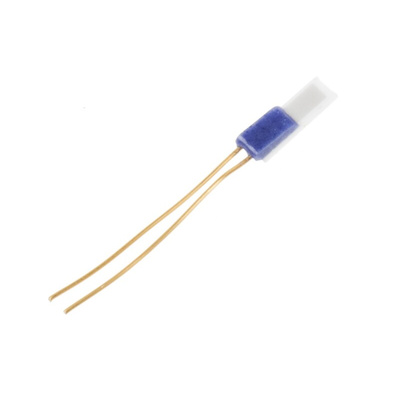* УТОЧНЯЙТЕ ВОЗМОЖНОСТЬ, ЦЕНУ И СРОК ПОСТАВКИ, В СВЯЗИ С ОГРАНИЧЕНИЕМ ЭКСПОРТА ТОВАРОВ ИЗ СТРАН ЕС И ВЕЛИКОБРИТАНИИ
RS Pro Thin Film Pt100 & Pt1000 Platinum Resistance Temperature Detectors
From RS Pro a high-quality and reliable Pt100 and Pt1000 PRT (Platinum Resistance Thermometer) or RTD (Resistance Temperature Detector). These temperature sensors have a thin film construction for accurate and reliable temperature measurement along with a fast response time to temperature changes. This design is also resistant to both vibration and shock. The flat design of these PRTs makes them ideal for measuring temperatures on surfaces
What is a Pt100/Pt1000 RTD?
An RTD is a type of temperature sensor based on the correlation between metals and temperature. As the temperature of a metal increases so does it's resistance to the flow of electricity. This resistance can be measured and converted to a temperature reading. ’Pt’ stands for platinum (platinum wire or film) and ’100’ means the temperature sensor has a resistance of 100 Ohms at 0°C and '1000' means it has a reistance of 1000 Ohms at 0°C. Platinum is the most reliable metal due to it's linear resistance to temperature relationship over a large temperature range.
What is a Thin Film RTD?
A thin film platinum RTD consists of a thin layer of platinum (usually 1 micron thick) on a ceramic substrate. This is then covered with a layer of epoxy or glass for protection against high voltages and to maintain a high insulation resistance. The thin layer of platinum results in the sensor having a high resistivity and fast response times to changes in temperature. Thin film RTD elements are sometimes incorporated into protective housings or other types of assembly allowing them to be used in harsh conditions
Features and Benefits
• Thin film construction
• High stability and accurate output
• Linear output over a wide operating range
• A fast thermal response time of 0.1s
• Resistant to vibration and shock
• Temperature measurement range from -50 to +500°C
• 10 mm lead wires
Applications
These thin film PRT temperature sensors are suitable for surface and immersion applications where protected. Their flat design means they offer a minimally intrusive means of measuring temperatures on flat surfaces. Applications include the following:
• Automotive industry
• Chemical industry
• Micro-electronics
• Air conditioning and refrigeration
• Air, gas and liquid temperature measurement
• Food processing
• Laboratories
Frequently Asked Questions
How Does a PRT Temperature Sensor Work?
The PRT temperature sensor works by placing the sensor element (or process end) into the equipment or process that requires temperature measurement. As the temperature of the platinum resistance thermometer increases it’s resistance to the flow of electricity increases. For every increase per degree of temperature the electrical resistance also changes by a set ratio, this is called the temperature coefficient. For platinum, this ratio is .00385 ohm/ohm/°C which means for a Pt100 with a 100 ohm resistance the increase in resistance per degree of temperature would be 0.385 ohms. The total resistance reading can, therefore, be measured and converted into temperature.
How is the Resistance Measured?
The resistance generated by the Pt100 or Pt1000 RTD is measured by passing current through one of the wires to produce a voltage. This voltage is then measured using a suitable bridge or voltmeter and the resistance calculated in ohms using Ohm’s Law (R=V/I). Once the resistance known you can convert it to a temperature reading using a calibration equation or a Pt100/Pt1000 table. A temperature measurement device or calibrator can also be connected to the sensor that will automatically convert the measured resistance into a temperature reading
Техническая спецификация RS Pro Datasheet
RS Pro Datasheet RS Pro Thermocouple Connector Selection Guide
RS Pro Thermocouple Connector Selection Guide RS PRO Cables Guide
RS PRO Cables Guide RS PRO Connectors Guide
RS PRO Connectors Guide RS PRO PRT Guide
RS PRO PRT Guide RS PRO Thermocouple Guide
RS PRO Thermocouple Guide RS PRO Datasheet
RS PRO Datasheet| Самовывоз со склада поставщика в Екатеринбурге | Забираете сами или вызываете курьера |
| ТК Деловые Линии | от 500 руб |
| Курьером EMS Почта России | от 500 руб |
| Другой транспортной компанией | По согласованию |


